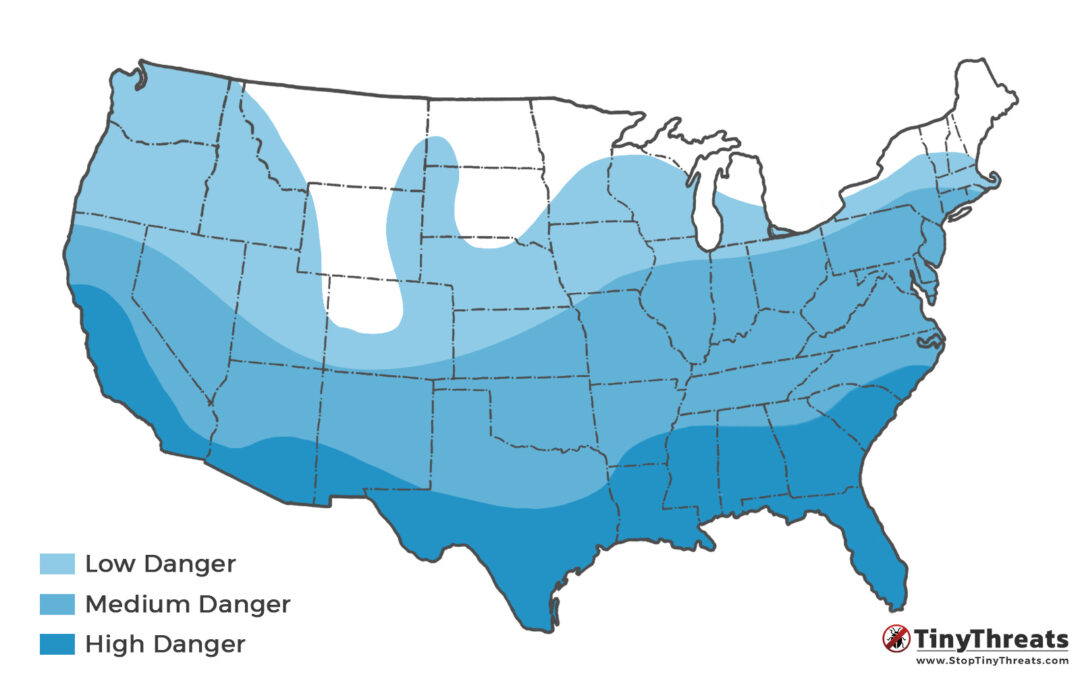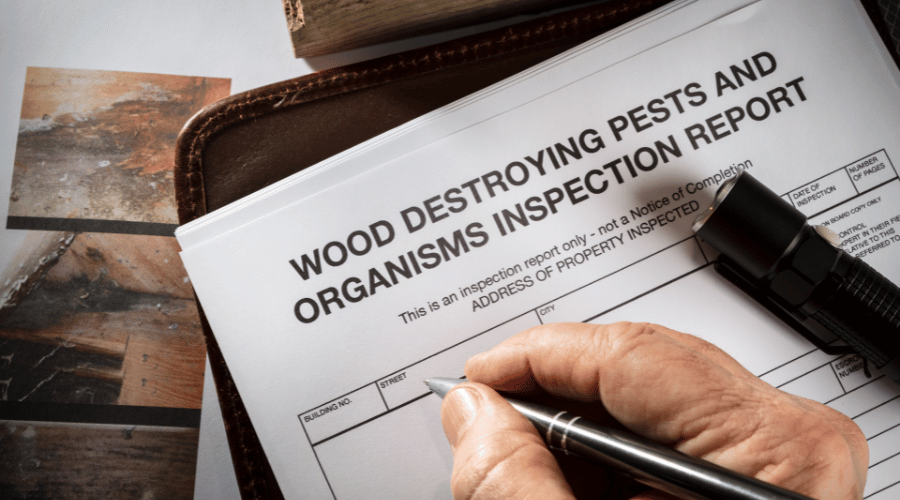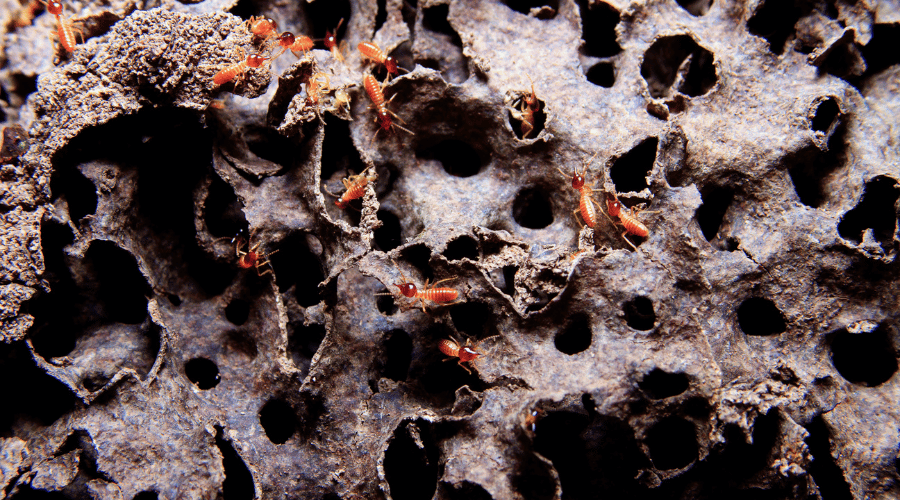Soil treatment for termite control is one of the most effective ways of keeping termites away from your house. It’s also called liquid soil treatment or chemical treatment.
While soil treatment is only useful against subterranean termites, it is highly effective to keep these termites away for up to five years.
While it’s quite a bit of effort to implement, it can be turned into a 5-minute process – more on that later.
However, it’s not for everyone – some properties are not a good fit for soil treatment for various reasons.
Keep reading to figure out if this is what you need to keep your home safe from termites for many years to come.
Table of Contents
How Soil Treatment for Termites works
Soil treatment for termites is actually quite simple: The soil is soaked strategically with eco-friendly pesticides that either repel or kill all termites that come into contact with it.
However, it’s not as easy to actually perform such a treatment.
First, you have to dig a trench – usually around 5 inches deep and wide – around your entire house, close to the walls.
Then you pour in liquid pesticides, mixed with water as per the product’s guidelines, filling the entire trench. Some turn the long channel into many smaller partitions and fill them one by one.
Finally, you shovel all the soil back into the ditch after you’ve mixed it with the insecticide as well.
This process essentially creates a barrier around your house, like an underground wall, that termites won’t cross.
Alternatively, some companies also skip the digging and pump the chemicals deep into the soil through a long rod connected to a power pump and a tank full of pesticides.
Key Takeaways
- Liquid soil treatment creates a barrier around your house that kills termites that want to tunnel into your house
- This type of chemical treatment lasts around 5 years and is best done by a professional with all the right equipment
- Soil treatment works best with minimal external structures like patios or concrete paths
- Soil treatment does NOT offer 100% protection – but it makes it very easy to spot if subterranean termites reach your home
However, this is assuming you have clear soil all around your house. If you have a patio, deck, or any concrete paths surrounding or leading away from your house, you’ll have a problem: you can’t dig into the soil there.
You may need special drills that go through concrete so you can use special equipment to pump the pesticide solution through the holes into the ground.
In short: Liquid soil treatment is a job best done by professionals with all the right equipment, and the experience to do it right.
Because if you make even just one mistake with a repelling treatment, it might be ineffective. More on that next.
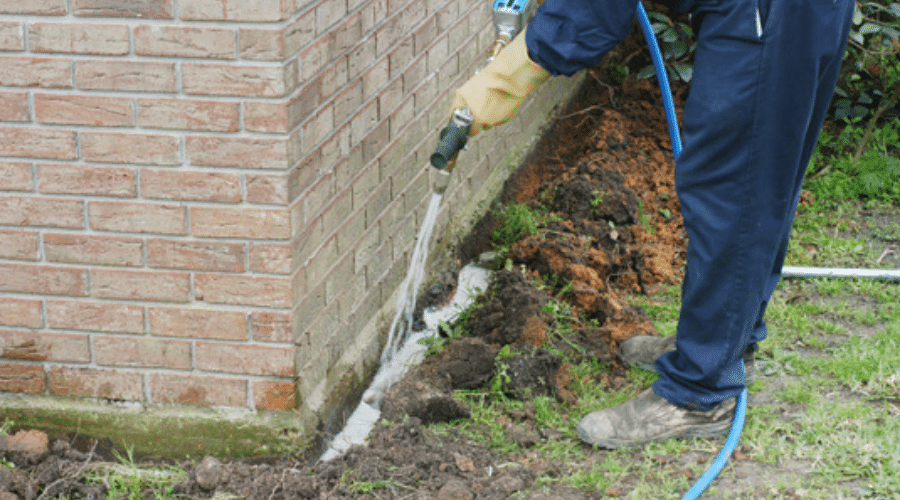
Chemicals are pumped into a trench around the house to create an underground termite barrier.
Types of Soil Treatment
There are two main types of soil treatment: Repelling and Killing. Repelling was the main type used in the past, but has been replaced by complex, deadly pesticides in recent years.
Repelling treatment uses a pesticide with chemicals that termites hate. They will not be willing to tunnel through soil affected by it.
However, if there is a gap in the barrier created by the treatment, the termites might find it and get into your home despite all the effort.
Termite-Killing treatments work by – you guessed it – killing all termites that try to tunnel through the barrier. Often, the chemicals are not repelling, so termites will tunnel a little bit and may even bring “infected” food back into the colony – killing off the next generation and possibly even the queen.
This is a lot like termite bait systems, although they are usually much more effective at killing termites, while the soil treatment is much more effective at keeping termites away from your home.
Cost of professional termite soil treatment
The cost of chemical treatment for termites depends mostly on the size of the house. While the national average (USA) is around $550-$600, it can go as low as $300 or cost $1,200 and more.
The price can easily be estimated by using the estimated length that the trench needs to be – expect to pay between $4 and $14 per linear foot.
Factors affecting the prices are mainly the specifics of the property – such as how deep the trench will have to be dug, and if there are any obstacles like patios or concrete paths.
A professional assessment is necessary to know if chemical soil treatment is even the right choice, and how much it would cost.
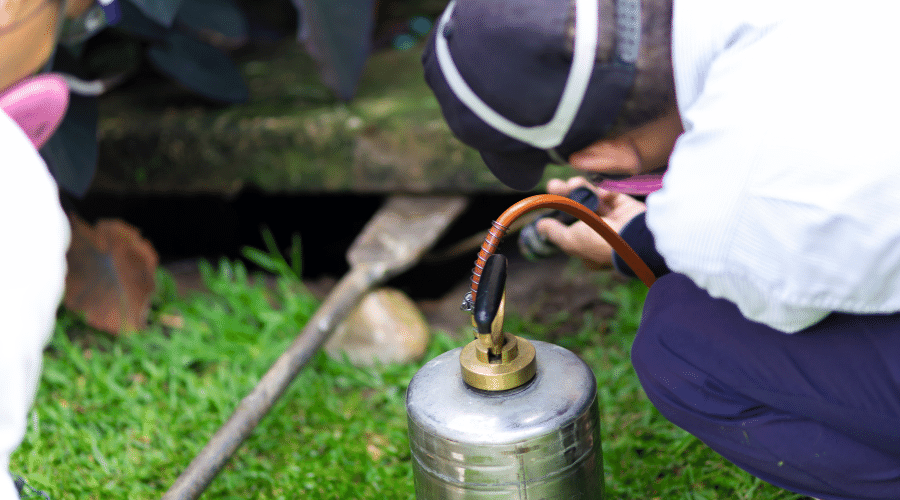
Effectiveness of Soil Treatment
It’s a common mistake to think that a professional chemical treatment prevents any termite activity. Your home may still be invaded by termites, despite a working barrier in your ground.
However, because of the “termite barrier” in the soil, the termites will have to tunnel up to the surface and build mud tubes to reach your house.
Don’t mix this up with termite barriers (also called shields), which are metal constructions in the building’s foundations.
These mud tubes are visible even to untrained-but-attentive homeowners. When you see them, you can call your pest control company and get them to deal with the termites before they can cause any real damage.
Without the soil treatment, termites may be able to invade your home and eat away at the structure for years before you notice them. Thus, the soil treatment can be the difference between a simple $300 extermination, and a $3,000 fumigation and thousands in repairs!
Is DIY soil treatment possible?
While DIY soil treatment is possible, the damage that termites can cause to your home is extensive, which is why we recommend hiring a professional pest control company unless you have experience with the process.
Other treatments may be fairly easy, but soil treatment is not only a ton of work without the right tools, it can also get dangerous since you would be handling large amounts of dangerous pesticides.
Mistakes and misuse are not only a potential waste of money and time, but can even be a risk to yourself and the ground of your property.
Liquid Soil Treatments for your Garden/Yard
Since soil treatment is normally used to form a barrier around your house, it’s not a good choice to protect your garden or yard against termites.
You can use some of the chemicals used for liquid soil treatment and spray it onto or into your yard, but it will not have the same effect, as it won’t reach as deep into the ground.
You also need to be careful about the type of pesticide you use, as some are harmful to plants and the soil quality as well.
Termite Proofing a new Construction with Soil Treatment
Before or during construction is a great time to get the first round of chemical treatment in – so you have as few obstacles as possible and create a long-lasting termite-killing barrier around your future house before it can ever be in danger.
(More termite treatments for new constructions)
If you decide to get the first soil treatment before or during construction, it’s also the perfect time to install a reticulation system.
Reticulation Systems – Easy soil treatments
A reticulation system is a shortcut for future chemical treatments against termites.
It works like an underground irrigation system for lawns: Every few years, your local professional can use it to spread a fresh load of pesticides into the soil, renewing the barrier that protects your home.
This means you can put it in place once, then skip the whole digging and spreading pesticide – and get the entire process done in less than an hour, potentially even without professional help.
The installation will cost more upfront, but will save you a lot of money in the long run.
Note that while this is easiest to install before or during the construction of your home, you may still be able to get a reticulation system installed at a later date.
Common Questions
How to get rid of termites in soil naturally?
It depends on your definition, but there is no reliable method to get rid of termites in your soil naturally. While some “natural” treatments exist, like using Orange Oil to kill termites, it’s not exactly natural to drench your soil in hundreds of gallons of orange oil.
Modern pesticides have specifically been developed to make them environmentally safe to use, since many of the more toxic chemicals have long been banned.
While you can combat termites living in furniture or other objects with natural solutions such as excessive heat and sunlight, you cannot do this to termites living up to 20 feet below your house.
How deep in the soil do termites live?
Termites usually live around 5 feet deep in the soil, but it depends on location and season. Close to the sea, termites may only dig as deep as 3 feet since they don’t want to hit the water level.
During winter, termites burrow far lower into the ground where the freezing cold won’t reach them. In these cold months, termites can dig around 20 feet below ground, with some reports suggesting that colonies may extend up to 40 feet deep.
Subterranean termites get their moisture from the soil, which is why they want their colony to be highly humid – 97-100% humidity in the air within the colony is what is ideal for termites. (source)
To keep the moisture and temperature levels in ideal conditions, they can expand and move through the colony as the seasons change.
Which chemicals are used as a Soil Treatment in Termite Proofing?
While there are many different pesticides, with new chemicals being developed regularly, there are a few common ones:
- Fipronil: Kills termites, popular pesticides
- Bifenthrin: Kills termites, very fast acting (within 24h), but doesn’t last for more than a few months
- Imidacloprid: Toxic to termites, good for DIY projects, but doesn’t last for more than a few months
How long does Termite Soil Treatment last?
While some products claim that they last up to 10 years or more, soil treatment for termites should only be expected to last about 5 years.
Because of shifting soil, roots, and other natural factors, the effectiveness of soil treatment diminishes after a few years. Re-doing the treatment every 5 years is highly recommended for complete protection.

